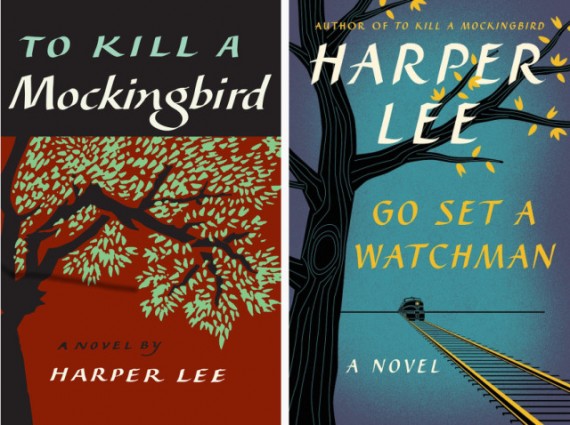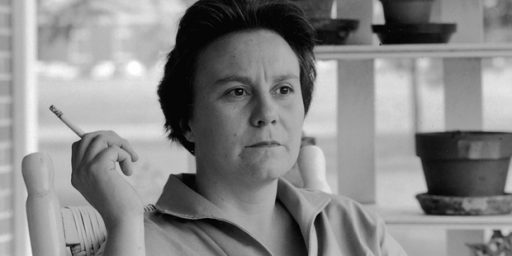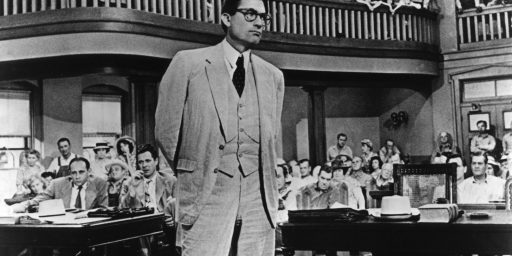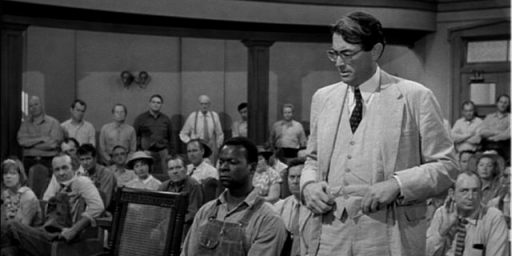No, ‘Go Set A Watchman’ is Not a Sequel to ‘To Kill a Mockingbird’
Keith Collins and Nikhil Sonnad provide strong evidence that the "sequel" to Harper Lee's classic novel was merely a bad first draft.
Keith Collins and Nikhil Sonnad provide strong evidence that the “sequel” to Harper Lee’s classic novel was merely a bad first draft.
Go Set a Watchman, released worldwide this week, was initially portrayed as a long-lost second novel by Harper Lee. But reports leading up to its publication have made clear that Watchman is more accurately seen as the early first draft of Lee’s classic work, To Kill a Mockingbird, which won the Pulitzer Prize for its depiction of racism in the deep south of the United States during the Great Depression.
As it turns out, many passages can be found in both of the books, almost word-for-word.
Watchman takes place two decades after Mockingbird, featuring many of the same characters but a different narrator and some starkly divergent themes. Most notably, Atticus Finch, the moral hero of Mockingbird, turns out to be an unapologetic racist in Watchman. Lee handed in the manuscript of Watchman in 1957; her editor, Tay Hohoff, described it as ”more a series of anecdotes than a fully conceived novel,” guiding a wholesale revision of the novel into Mockingbird, which was published in 1960. It’s not clear that Lee, now 89 and ailing, ever intended to publish Watchman as a separate book.
All of that was pretty clear months ago but the “long-lost second novel” meme has somehow overtaken the facts, most notably with the Finch controversy. Follow the link to see how much overlap there was, as well as other evidence that Watchman was just a poor draft of Mockingbird.







I really hope Ms. Lee was the one who decided to release this book. If she was manipulated into it it’s damned dirty work. I have the feeling (without having read the book) that the net effect will be a dilution of her iconic characters and her initial book. If she wanted it, I have no problem with it, it’s hers, she can do as she feels best. But if this is just rapacious hangers-on pushing her to do it that will suck.
@michael reynolds: I’m inclined to agree. I will probably read it, but it might be hard to reconcile it with To Kill a Mockingbird.
The first chapter is up at The Guardian, if you’d like to read it. I got a chuckle out of Lee’s statement of the basic principles of golf: “a stick, a small ball, and a state of mind.”
http://www.theguardian.com/books/2015/jul/10/harper-lee-new-novel-first-chapter-extract-to-kill-a-mockingbird
Not having read the new book I don’t know if this is the case in this novel specifically, but the tragic character who is ahead of society while young, but later overtaken (often as a result of the changes they themselves helped initate) and becoming regressive in their old age is both realistic and interesting.
My theory is that it was written pseudonymously by Alan Moore as a sequel to Watchmen.
The Comedian has just been retconned as Atticus Finch, Silk Spectre as Scout, and Rorschach as Boo Radley. The rest writes itself, really.
(Actually I agree with michael reynolds. This screams to me that Ms. Lee’s name has been used to make money for people not named Harper Lee.)
@michael reynolds:
Agreed. I have a very uncomfortable feeling about this whole thing.
The Onion nailed it, I fear:
http://www.theonion.com/article/harper-lee-announces-third-novel-my-excellent-care-50840?utm_source=Twitter&utm_medium=SocialMarketing&utm_campaign=Pic:1:Default
As much as I would love to read another Lee novel, this whole thing seems like the greedy exploitation of an elderly woman who never intended to publish it. I hope I’m wrong, but I doubt I am.
Saw a video on this the other day. It featured (but did not show) Lee’s lawyer giving her a copy of the published book……
And talking to her like a child. Something tells me this would not have occurred if Lee wasn’t elderly and infirm.
@michael reynolds: everything I’ve read indicates that Harper Lee wouldn’t publish this is her right mind. I won’t read it, but I will re-read To Kill a Mockingbird.
Whatever the literary value of the work, it has value for scholarly purposes. I can’t feel bad about anything that increases our understanding of an artistic world.
@Pinky:
Then that scholarly value would have, and should have, been realized after her death as discovered amongst her inedita.
To publish it now, when Lee is obviously mentally incapacitated, is a naked money grab by her handlers. She has vowed for 50+ years that she would never publish another novel. Her lawyer, her agent, and HarperCollins are leeches.
She’s 89; we could’ve waited a few years for this come out.
@de stijl: Doesn’t matter if there are leeches in the pond, as long as nobody dives into the water. How big a seller is this expected to be?
@Pinky: “How big a seller is this expected to be?”
Well, if they sell one copy for every story the Times has run about it, it will outsell Gone With The Wind…
@Pinky:
Harry Potter huge.
@James Pearce:
Ted Cruz huge.
@Pinky:
What an odd response.
Does publishing someone’s novel against her express wishes for a modest profit rather than for a massive profit get you into a lesser circle of hell? It’s a utilitarian notion.
BTW, the book is #1 best seller on Amazon.
The plot of Stephen King’s Misery comes to mind.
@Rob Prather:
On the other hand, think how much poorerfor it the world would be if Franz Kafka and Emily Dickinson had got their way regarding the disposition of their unpublished work. Thankfully Max Brod and Lavinia Dickinson chose to ignore them.
@Stormy Dragon: Point taken, but posthumous work is somewhat different. I wouldn’t mind if, after her death, Harper Lee’s estate sought to publish all the manuscripts they found in her desk drawer. That’s scholarship.
But tricking an old lady into saying yes to publishing a book she would never publish? That’s fraud.
Huh. When I said that way back when, I got jumped on by the language police. Go figure.
Samuel Clemens (Mark Twain) did not want his book Letters To The Earth published and it wasn’t until well after his death. I’m glad they did, it was a marvelous read and perhaps Twain at his best.
Saint-Saens didn’t want The Carnival of the Animals to be released until after his death, because he was worried it’d overshadow the rest of his works. (It did,)
I was genuinely asking about the first printing of Go Set A Watchman. I didn’t realize it was so big. I’ll never understand why so many people would be expected to buy a work that probably isn’t very good. Especially a book – the time investment is sizable. (I probably make the same mistake in my political prognostication, assuming that people will survey the possibilities and choose the party or candidate that’s the best fit. I’m too much of an NT to understand SJ loyalties.)
@Pinky: “I’ll never understand why so many people would be expected to buy a work that probably isn’t very good. Especially a book – the time investment is sizable.”
Seriously? It’s not even 300 pages. Anyone with a high school education could get through it in an afternoon.
It’s a lot faster for those who don’t have to move their lips…
I read Mockingbird in about 1965. I thought it was o.k. not wonderful because for me at that time a book plea for fair treatment of a minority group seemed like not much of a moral reach; the author was no Zola in my opinion. Nor did the book open the human heart the way something like Lolita of about the same vintage did. I do believe that the Southern system of racial discrimination was deeply inculcated in many people, and I would like to read a book that explores the heart of people who hold those beliefs. I loved Faulkner, but he steered around racism even in works like Absolum. A racist Atticus Finch would be very interesting to me.
@wr: I’m a slow reader, I guess.
@Slugger: Have you tried Invisitble Man?
@wr: I would be interested in a book looking at a nice Southern gentleman who is considered decent by friends and neighbors but harbors racist ideas at his core, someone who is not a redneck stereotype. Ralph Ellison was a great writer, and his passion and righteous anger produced a great work, but I would like someone to get inside a person like the very courtly man who tried to get me interested in the Southern Baptist church who was surprised when I asked about black congregants.
Atticus Finch was shown to us from the point of view of Scout, and it is no surprise that she knows nothing of any flaws in him. Maybe a new point of view shows a more rounded view of a human being rather than the shining knight in his daughter’s eyes. a
@Pinky:
Hardly.
Of the many Saint-Saens works still in the repertory, by far the most played (and most recognized) is his Symphony #3, the Organ Symphony — among the greatest symphonies of the 20th century. After that, it’s probably the “Introduction and Rondo Capriccioso” for violin and orchestra. Then the 3rd violin concerto, the Danse Macabre, and (yes) The Carnival of the Animals — or at least the famous Swan movement. Saint-Saens wasn’t so much worried about TCotA overshadowing his other works; he was worried that the frivolity of the work would cause people to take his other compositions less seriously.
My sense is that the relative fame of The Carnival of the Animals has diminished sharply since its publication. This is partly due to the sheer quality of Saint-Saens’s other works, and partly due to the fact that classical music is no longer a part of popular culture. People who would have been more attracted to TCotA vice the Organ Symphony simply don’t listen to classical music these days.
@DrDaveT: I love the Organ Symphony. It doesn’t seem to get many performances, though, because it requires an orchestra and organ. I see the Carnival of the Animals listed regularly among family-friendly performances.
@Slugger: Maybe Walker Percy has something along those lines? Or Robert Penn Warren?
I’m agreeing with Michael Reynolds, Rob, and Mantis here, and I will not be reading this book. Something stinks here, and I think this book would not have been released had Harper Lee been in her right mind. And no, I do not believe that she simply forgot about the manuscript of the only other novel she wrote.
@Pinky:
Fair enough — but live performance classical music is even more of a dinosaur than classical music in general, these days. The vast majority of exposure to classical music is via recordings and (to a decreasing degree) FM radio. For them, there are plenty of recordings of the Organ Symphony to choose from. (My personal favorite is the 1980 Telarc early digital recording of Eugene Ormandy and the Philadelphia Symphony Orchestra, with Michael Murray on organ.)